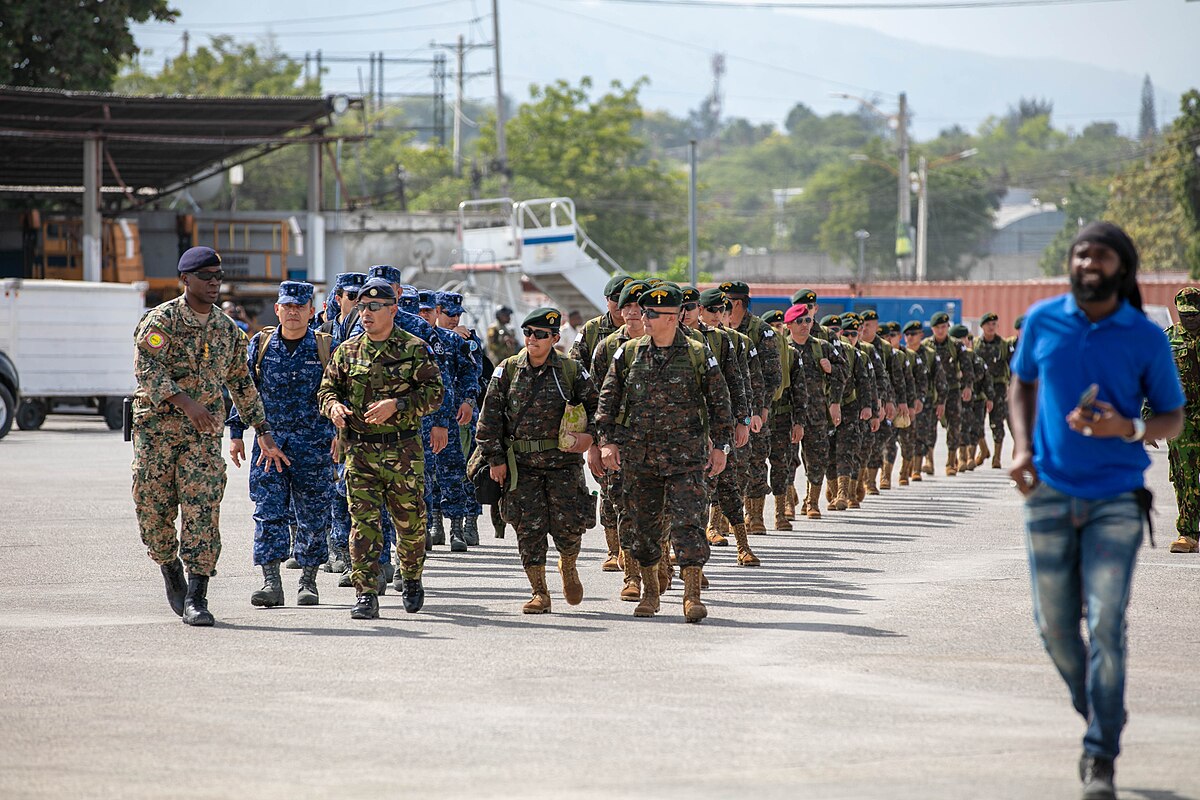Soldiers from Guatemala and El Salvador arrive for United Nations’ sanctioned Multinational Security Support (MSS) mission (MSSM) to the Republic of Haiti arrive on 3 January 2025. Photo in public domain/U.S. Embassy Haiti.
Haiti: A Perfect Storm of Suffering
As the violent crisis in Haiti deepens, Haitians in the United States are going to court to protect their right to Temporary Protected Status.
Haiti continues to spiral into lawlessness and grave suffering. According to a UN report, a record 1.3 million people in Haiti are displaced by gang violence, more than half of whom are children. Armed gangs have taken control of almost all of Haiti’s capital Port-au-Prince in an extended conflict that has displaced more than one million people, killed thousands and fueled famine-like hunger. The situation in Haiti is a prime example of how organized crime can systematically drive displacement and transform crime into a mechanism for territorial and social control.
And yet, the Trump administration, without the required Congressional review process, attempted to end Temporary Protected Status (TPS) for Haitians in February. The TPS designation is typically accorded to individuals from countries experiencing crises, such as natural disasters and civil strife. It allows them to stay in the United States temporarily, with eligibility to work.
In late July, Haitian TPS beneficiaries filed a class action lawsuit against the Trump administration. The suit argues that “gang violence persists in Haiti as many gang groups operate with impunity, enabled by a weak or effectively absent central government, and that gangs inflict on Haiti terror, including rape and other forms of sexual violence.” The U.S State Department has advised American citizens not to travel to Haiti due to kidnappings, crime, terrorist activity, civil unrest and limited health care.
Rep. Cherfilus-McCormick and Senator Markey plan in mid-September to file an amicus brief to protect TPS for Haitians. In the brief, they aim to make it clear that Congress will preserve TPS and that ending TPS for Haitians will have a negative impact on the economy. At the time of publication, they were actively seeking cosigners from their fellow members of Congress.
On August 3, an Irish missionary, Gena Heraty, director of St. Helene Orphanage in Kenscoff, south east of Port au Prince, was kidnapped along with seven Haitian, among them a 3 year-old child. They were held captive for almost a month. They were released on Aug 29. The orphanage is run by the international charity Nos Petits Frères et Soeurs and serves 240 children.
At the UN, Acting U.S. Ambassador Dorothy Shea announced that the United States and Panama are proposing to the United Nations to establish a “Gang Suppression Force” to help curtail the escalating violence in Haiti. It is unclear how this force will differ from the current Kenya-led Multinational Security Support mission (MSS), which has been in Haiti since June 2024. In February this year, the UN Secretary-General, Antonio Guterres proposed an office that would provide drones, fuel, ground and air transportation, and other logistical support to the MSS.
The UN Secretary General urged the Security Council to “act without delay and authorize an international force, supported by the United Nations through logistical and operational backing, and predictable financing.” He further pointed out that “Haiti is a perfect storm of suffering.”
Seven countries, including the United States, informed the UN Secretary General that they were taking action on another of his recommendations: to form a “Group of Partners” to provide “high-level strategic direction, oversight, and political decision-making for any revamped security force.” Besides the United States, the group includes Canada, El Salvador, Guatemala, Jamaica, Bahamas and Kenya. The seven pledged to work to secure voluntary financial contributions for costs not covered by the UN Support Office, to faciliatate an increase in force numbers and to provide coordination for a revamped force including putting a special representative in Port-au-Prince.
The ongoing crumbling of state authority and escalation of gang violence, beyond Port au Prince, have caused hospitals and schools to close, and random road blockades/takeovers have made delivering humanitarian aid unsuccessful. Although the school year is starting in October, more than a month late, there is no guarantee that parents will allow their kids to return.
Additionally, the UN has requested $908 million for humanitarian support to 3.9 million Haitians in need of assistance. To date, less than 10 percent of this has been received, making Haiti, according to Guterres, “the least funded humanitarian appeal in the world.” He fears that if the donors do not act quickly, about 3.7 million vulnerable people risk receiving no assistance at all.

